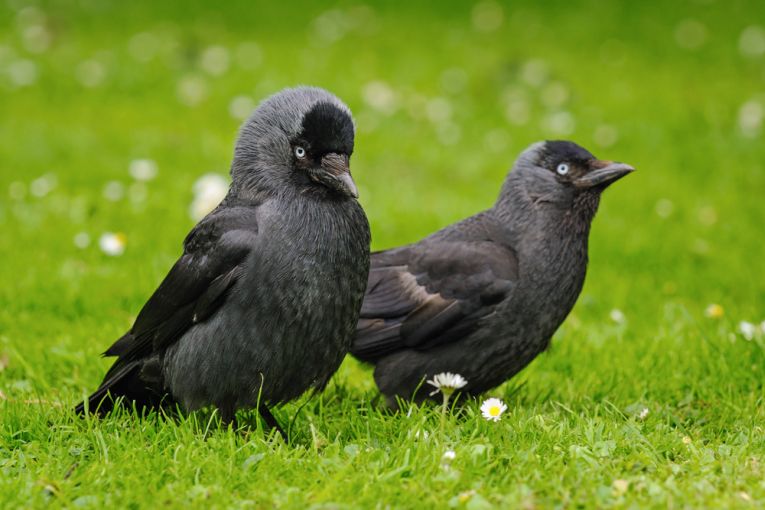The University of Groningen in the Netherlands has studied the common or western jackdaw,Corvus monedula, with Simon Verhulst and 4 colleagues producing another paper today entitled Social life histories: jackdaw dominance increases with age, terminally declines and shortens lifespan.
The social life of all the crow family is familiar to many of us, giving the memorable naming of, "a clattering of jackdaws." That caw or chough noise is not the only social communication for these highly intelligent animals. Their obvious adaptations to coastal locations, domestic chimneys or even in stealing objects has endeared the jackdaw to humans for thousands of years. Here, though, only the inter-bird relations are used to detect the influence of age. We've only looked at age rarely in Earth Times. Here is a trick using giraffe coats to estimate the age of Giraffa camelopardalis thornicrofti in Giraffe pelage.
Senescence in theory is designed to replace the old with younger, breeding individuals who need less body maintenance. Variation in abilities to gather resources allows scope for a balance between reproductive investment or body repair. This important procurement of resources governs the way in which ageing processes will work.
All factors that help the jackdaw to access resources interact. Body size is very important for competition and hence growth. The jackdaw is ideal too study how learning and experience interact with those factors. The researchers also studied social dominance as it has potential to affect all the others.
The semi-urban environment of 69 males was investigated, using their tarsus length (which remains the same during adulthood), wing length and weight to estimate some aspects of their dominance. The higher socially dominant birds always seemed to correlate with longer tarsal length. Strangely, age did not correlate with dominance overall, although individuals became more dominant with age.
Dominant birds disappeared from the colony studied when quite young. The indication is that they had lower survival rates, possibly meaning some kind of decline. Statistical analysis revealed these animals to be dead, rather than simply dispersed. The life-history of a jackdaw slowly unwinds with these details, showing how genetic factors such as size are involved with environmental factors such as food supply. In their last year, which sounds so sad, the more dominant males lost their place in the hierarchy, then died, proving it sometimes doesn't pay to be top dog!
So the cost of dominance is a short life. So what are the benefits? Simon and the others knew that mating with one partner is normal. The number of reared offspring would be expected to be higher, but unfortunately, lower ranked males produce more! The negative fitness of testosterone-rich dominant jackdaws is really strong. The nest-boxes used by all jackdaws in this colony are close together, with the possibility that stress hormones as well as testosterone could be involved in reducing life span. A study in the sociable lemurs showed similar final year loss of dominance within the community. Aggression is frequent in dominant jackdaws and it is this quarrelsome behaviour that may cost lives.
The dynamics of jackdaw society need to be studied from both sex's point of view, but the males rule the roost in this species. Natural conditions where predators are present and competition is hard will promote certain behaviours. Cognitive ability is this species is well-known to be important, perhaps more than competitive spirit, while sexual signalling is suggested by the paper as another likely ability to influence the mix that creates this senescence in perhaps the human favourite of the crow family.
The research will go on and other animals including ourselves will doubtless be drawn into the researches. If only jackdaws could talk - wait a minute, I remember a talking jackdaw!










